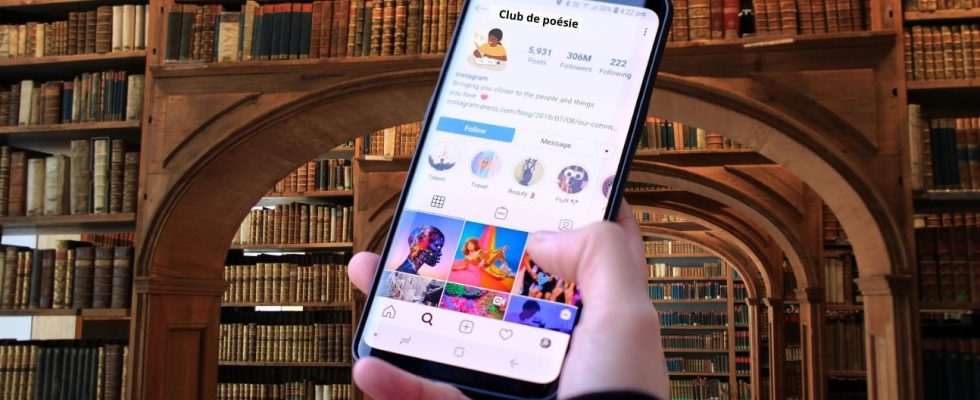“A worrying dropout.” These are the conclusions of a new study from the National Book Center (CNL), produced by Ipsos and published this Tuesday. For the young people aged between 7 and 19 interviewed, reading would no longer be a pleasure, but a necessity for their schooling. One literary genre still seems to be an exception here: poetry which rises to 9th place among the most read literary genres with an increase of more than three points compared to 2022. Not enough to make headlines, of course, but it It is good to ask ourselves if this new hype is not due, in part, to social networks?
Remember the summer of 2022. On many videos published online, a maxim was looped, that of the writer Jean d’Ormesson on happiness. “Look, I never stopped being happy. You know, there is a phrase that I have often repeated: ‘Thank you for the roses, thank you for the thorns’. What suggests a budding passion of the younger generation for the academician who died in 2017? Perhaps, but Jean d’O was not the only one. It seems that poetry has largely made a place for itself on social networks.
“Words are accessible to more people”
For example, just take a look on behalf of “Cameron flips” – followed by nearly 41,000 subscribers on Instagram. The young twenty-something, who has always been passionate about poetry, shares beautifully crafted videos which are accompanied by moving texts on everyday life, youth or even emerging feelings. Recently, she even decided to adapt the texts of her works on videos.
“I’m pleasantly surprised by how much people like it. It’s my publications that work the best,” she rejoices. She also noticed this revival of poetry a few months ago. “It must undoubtedly be linked to the taste for everything aesthetic, but also to the rise of Booktok and eloquence competitions,” muses the content creator who also participates in these events.
Although her passion for writing has followed her for a long time, she knows that the literary genre is not necessarily the most appreciated during school. “We often associate poems with somewhat boring recitations, with finding figures of speech without even understanding the meaning of the poem and its beauty,” admits “Cameron freaks” who sees in social networks a more “playful” path to poetry. “It is now associated with a pleasure and not an obligation of the school. Words are accessible to more people, where before, beautiful words were reserved for an elite.”
Diversify from social networks
A few Instagram pages away, Hadrien aka Verbal Droppings – followed by 95,000 people – can only confirm this renaissance of poetry. “I realized that there was literary poetry, that of the authors that we study at school and who bring a literary genre to life. But for me, there is also a path that was possible for the false poetic, everything that we recognize as poetry but that we have difficulty naming.” And clearly, it is this new form of poetry that is flourishing online.
Hadrian does not pretend to be a great playwright, he himself admits having taken a long time to arrive at poetry. The genre came to him while working in advertising “through a taste for witty words and well-constructed sentences”. But once on social networks, the evidence was there. “It’s the kind that allows the most freedom and the one that does the most good.” A kind of therapy that he shares on his account through poems published every two to three days and accompanied by colorful drawings.
The recipe for success is not miraculous here, however. “On social networks, there is a need to express emotions that we have difficulty understanding and controlling,” underlines the author who published at the beginning of March I forgot it was beautifula “notebook of poetic experiences”, published by Solar.
“I often heard that poetry was everywhere and that you just had to look, but I found that they didn’t really prove it in the existing collections. I told myself that I was going to take it at face value and choose very common moments of life and challenge myself to present poetic views in order to offer the reader the opportunity to complete the thoughts.”
To complete this spring cleaning and completely dust off poetry, Hadrien organized the first Poetry Club on March 22 at the Gaîté Lyrique in Paris. “The ambition of this event was to make poetry popular entertainment and leave behind the underground image that poetry could sometimes have.” Despite some apprehensions ahead of the event, the first poetry club was a full house, filling the 200 seats well before the event began.
A fashion that interests
A success which is not insignificant for publishing houses. “There is truly a written manifestation in the form of a book of something which is the expression of oneself on social networks,” summarizes Sophie Rouanet, editorial director at Robert Laffont. “Poetry allows us to tell our stories, to organize our thoughts, our emotions and to put them into shape both for the person who writes it, but also for the reader. It gives him the feeling of not being alone in his emotions.”
At Robert Lafont, we now take poetry very seriously. “Something important is happening, especially since it’s quite a surprising movement,” admits Sophie Rouanet, notably responsible for the works of Déborah Garcia, a poet born on social networks with the account “Cpartout” and author of All my chances are the same. Other successes can be found in bookstores, such as the works of Rupi Kaur, a poet who also became famous online. From there to becoming the number one literary genre, there is still a way to go, but modern poetry has a bright future ahead of it.

